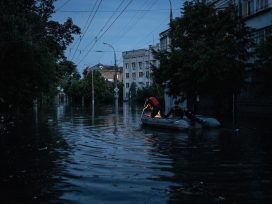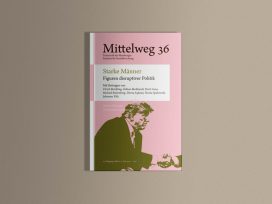Mittelweg 36
Our partner from Hamburg (Germany), the distinguished journal Mittelweg 36, convinces its readers not only contentwise but also through its elegant and innovative layout. Hans Andree and Wilfried Gandras are the layouters responsible for the graphical concept. Gaby Zipfel and Martin Bauer are the two editors of the journal which focuses on social research conducted in the fields of current social developments, the different aspects of war, war-jurisdiction, among many other issues.
Mittelweg 36 is the journal of the Hamburg Institute for Social Research. The journal is a bimonthly and has been published since April 1992. The journal accompanies the work of the Institute’s researchers, presenting plans for new research projects and reporting on the course of their development. The editors take-up or initiate debates on themes associated with the Institute’s research. Remarkably, the journal, just like the Institute itself, employs research tools and means of presentation which go beyond the range of traditional social science research and presents texts in various forms.
The new issue
Let’s now follow Mittelweg 36‘s structure: Each issue features an initial quote – in the last issue it is Andreas Gryphius’ poem “Tears from the Fatherland” (“Tränen des Vaterlandes”) a poem on the Thirty Years War. On page one we find the picture section (“Bilder”), this time entitled “Unpleasant Neighbours”: the postcards displayed have rather awkward motifs and sometimes playful, sometimes merely descriptive titles such as: “Unpleasant Neighbours” or “Dud-family”. A collection up until to a 28 cm granate”. It is a selection showing the rich variety of duds from WWI.
Following this pictorial and poetic approach to aspects of war, the content part opens with an editorial that reflects on new anti-Semitism and Judeophobia. Whereas so far anti-anti-Semites were considered identical to antiracists, these presumptions seem to have become blurred and have to be considered anew.
Leading on, Ètienne Balibar gives a close examination of the history of the French headscarf debate and the crisis of French laicism which, revealed through this debate, finds itself in crisis.
Balibar’s article is by far not the only interesting text in this issue: “Mittelweg‘s” literary supplement provides a highly informative text on “Sexual violence as war crime: A challenge for international criminal courts?”
The second focal point deals with German culture of memory and commemoration and compiles articles by Jan Philipp Reemtsma (“Memorials – what for?”), Klaus Naumann (“Institutionalized ambivalence. German politics of memory and the culture of commemoration after 1945”) and Gilad Margalit (“Culture of commemoration and mourning in post-war Germany. Notes on architecture”).
As always, Mittelweg 36 closes with its “Protest chronicle” reporting one special incidence of civil protest in Germany’s recent history. In this issue, it tells of the public suicide of one man during the 14 German Protestant Churchday in 1969. As it turned out, this man had been a member of the SS who wanted to set a mark against missing values in Christian life. The tragedy of this public death – after his speech he poisoned himself with cyanide – was that people did not notice that the man was publicly killing himself. The eminent German author Günther Grass was deeply moved by the incident and used it in one of his works. However, no further impact of this death has been reported.
For the extensive list of articles contributed by Mittelweg 36 please see: https://www.eurozine.com/journals/mittelweg-36/
Published 24 May 2004
Original in English
© Eurozine
PDF/PRINTNewsletter
Subscribe to know what’s worth thinking about.



